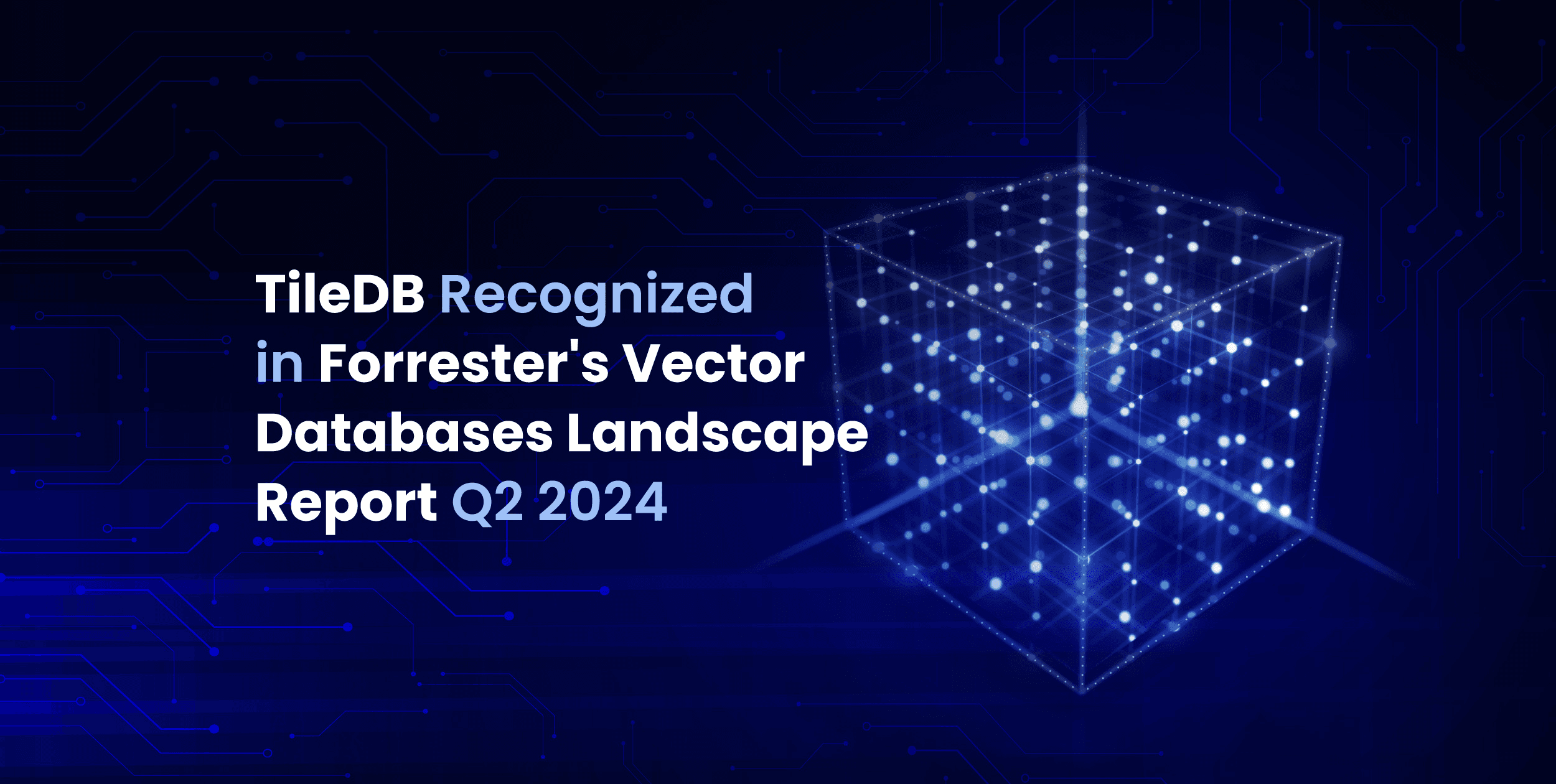TileDB, a pioneer in the space of Adaptive AI-Native Databases, is proud to have been included as one of 24 Vector Database Vendors
Cambridge MA, May 7, 2024 - TileDB Inc., the adaptive database for complex data and complex compute, today announced its inclusion in Forrester’s The Vector Databases Landscape, Q2 2024 report.
“TileDB is proud to have been included in Forrester’s overview of 24 vector database vendors,” says Dr. Stavros Papadopoulos, Founder and CEO at TileDB. “Our database has powerful vector search functionality, however, it is more than just a vector database. It is a modern database architected around arrays, which morph into any data modality offering unprecedented performance and lowering operational costs.”
Vector databases have recently gained in popularity due to the advent of Generative AI and the proliferation of LLMs. Organizations have many vector search solutions to choose from: from special-purpose databases (i.e, databases built from scratch just for vector search) to libraries and extensions of existing databases. Forrester’s report offers insight into the value technology and data leaders can derive from a vector database and lists how vendors differentiate by size, type of offering, geography and use case.
TileDB is an array database, and its foundational strength is that it can morph into practically any data modality and application, delivering unprecedented performance and alleviating data infrastructure bottlenecks in an organization. A vector is simply a one dimensional array; therefore, TileDB is the most natural database choice for delivering vector search functionality.
Specifically, TileDB offers the following benefits:
1. High Performance: Vectors are arrays, and arrays are a native data structure in TileDB. As such, TileDB delivers 2-10x faster performance than open source solutions, even under extreme scenarios.
2. Serverless: All deployment modes supported by TileDB are serverless, even when you need to outgrow your local machine and scale in the cloud. This has a direct impact on the operational cost, which TileDB minimizes.
3. Cloud-native: TileDB is uber-optimized for object stores. As such, you can scale your vectors to cloud storage, while enjoying superb performance. Again, this leads to significant cost savings, due to the inexpensive cloud object storage and the speed of all queries.
4. Multiple modalities: TileDB is not just a vector database. TileDB can store, manage and analyze all your data, which includes the raw original data from which you generate your vectors, as well as any other data for which your organization might require a powerful database. Storing multiple data modalities in a single system lowers your licensing costs; simplifies your infrastructure and reduces data engineering; and eliminates data silos enabling a more sane, holistic governance approach over all your data and code assets.
TileDB envisions simplifying data infrastructure by unifying diverse data into a single, modernized database system. As LLMs are becoming more and more powerful leveraging multiple data modalities, TileDB is the natural choice to use LLMs for insights on your diverse data, leveraging natural language as an API. Imagine extracting instant value from all your data, without thinking about code syntax in different programming languages, understanding the underlying peculiarities of the different data sources, or worrying about security and governance.
“Aside from the use cases listed above, TileDB also supports data discovery and exploration, data science (AI/ML), as well as image and video recognition,” continues Papadopoulos. “TileDB is an example of a comprehensive data management solution that seamlessly integrates vector functionality and has the power to reshape the landscape of specialized vector databases.”
Get started with TileDB
To learn more about TileDB’s vector search capabilities, check out the following resources:
TileDB-Vector-Search (Github repo)
Webinar with Sanjeev Mohan: Bridging Analytics, LLMs and Data Products in a Single Database
About the author

Devika Garg
Head of Marketing
Devika Garg leads product marketing for life sciences at TileDB. Prior to TileDB, she ran marketing engines at Pure Storage, Proteus Digital Health and Applied Materials. A scientist and a science journalist in her past life, she loves to geek out on the latest discoveries and inventions. She earned her PhD at the National University of Singapore, her MS in Science Communication at University of California Santa Cruz, and her B Tech at the Indian Institute of Technology Kanpur.
Meet the authors

